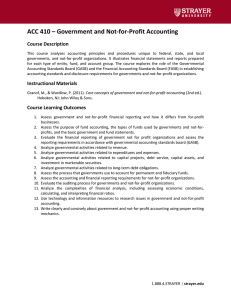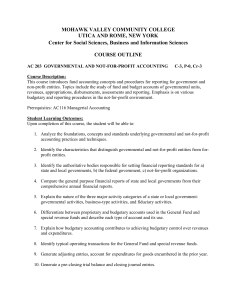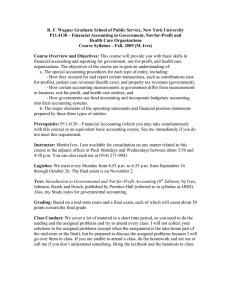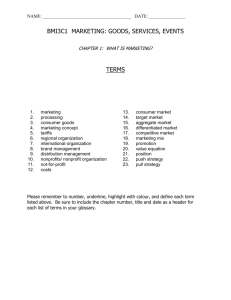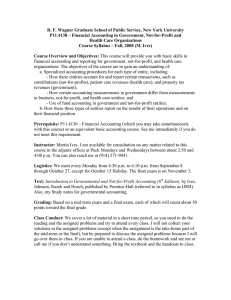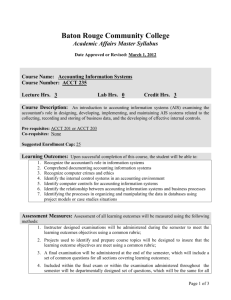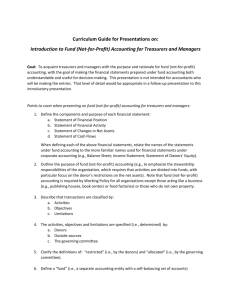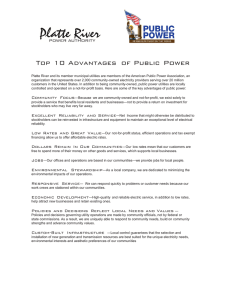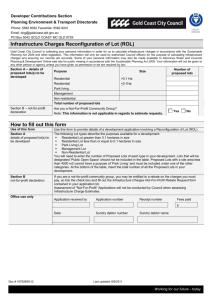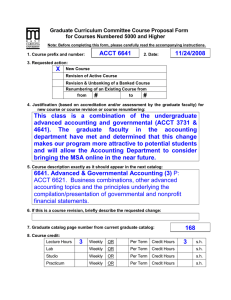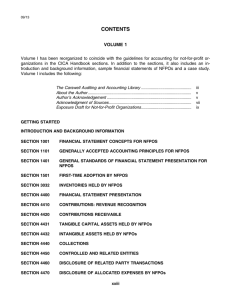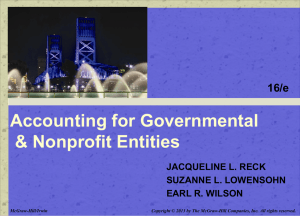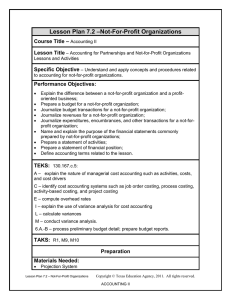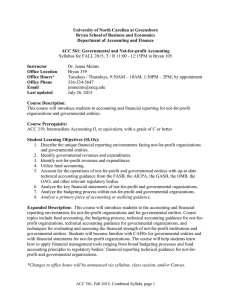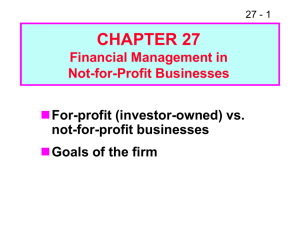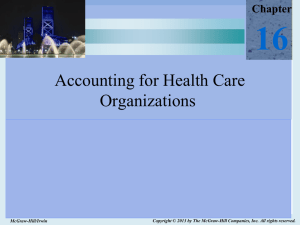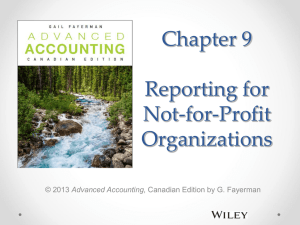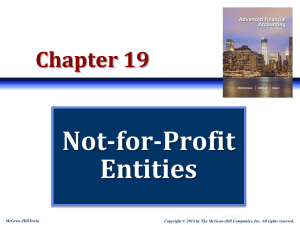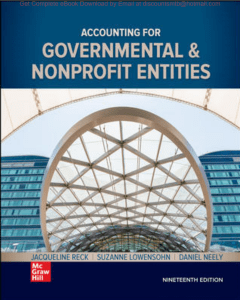ACCT 212
advertisement
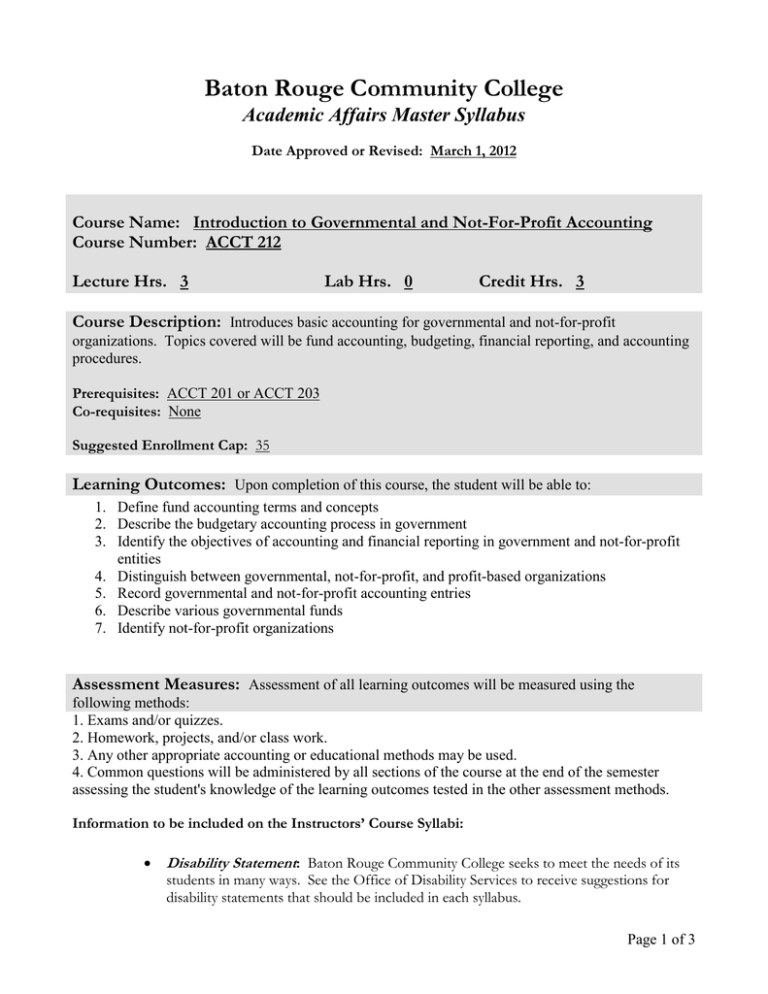
Baton Rouge Community College Academic Affairs Master Syllabus Date Approved or Revised: March 1, 2012 Course Name: Introduction to Governmental and Not-For-Profit Accounting Course Number: ACCT 212 Lecture Hrs. 3 Lab Hrs. 0 Credit Hrs. 3 Course Description: Introduces basic accounting for governmental and not-for-profit organizations. Topics covered will be fund accounting, budgeting, financial reporting, and accounting procedures. Prerequisites: ACCT 201 or ACCT 203 Co-requisites: None Suggested Enrollment Cap: 35 Learning Outcomes: Upon completion of this course, the student will be able to: 1. Define fund accounting terms and concepts 2. Describe the budgetary accounting process in government 3. Identify the objectives of accounting and financial reporting in government and not-for-profit entities 4. Distinguish between governmental, not-for-profit, and profit-based organizations 5. Record governmental and not-for-profit accounting entries 6. Describe various governmental funds 7. Identify not-for-profit organizations Assessment Measures: Assessment of all learning outcomes will be measured using the following methods: 1. Exams and/or quizzes. 2. Homework, projects, and/or class work. 3. Any other appropriate accounting or educational methods may be used. 4. Common questions will be administered by all sections of the course at the end of the semester assessing the student's knowledge of the learning outcomes tested in the other assessment methods. Information to be included on the Instructors’ Course Syllabi: Disability Statement: Baton Rouge Community College seeks to meet the needs of its students in many ways. See the Office of Disability Services to receive suggestions for disability statements that should be included in each syllabus. Page 1 of 3 Grading: The College grading policy should be included in the course syllabus. Any special practices should also go here. This should include the instructor’s and/or the department’s policy for make-up work. For example in a speech course, “Speeches not given on due date will receive no grade higher than a sixty” or “Make-up work will not be accepted after the last day of class.” Attendance Policy: Include the overall attendance policy of the college. Instructors may want to add additional information in individual syllabi to meet the needs of their courses. General Policies: Instructors’ policy on the use of things such as beepers and cell phones and/or hand held programmable calculators should be covered in this section. Cheating and Plagiarism: This must be included in all syllabi and should include the penalties for incidents in a given class. Students should have a clear idea of what constitutes cheating in a given course. Safety Concerns: In some programs this may be a major issue. For example, “No student will be allowed in the safety lab without safety glasses.” General statements such as, “Items that may be harmful to one’s self or others should not be brought to class.” Library/ Learning Resources: Since the development of the total person is part of our mission, assignments in the library and/or the Learning Resources Center should be included to assist students in enhancing skills and in using resources. Students should be encouraged to use the library for reading enjoyment as part of lifelong learning. Expanded Course Outline: I. Governmental and Not-for-Profit vs. Profit-based Organizations II. Governmental Accounting A. Describe objectives of accounting and financial reporting B. Define general accounting methods and terms 1. Accrual accounting 2. Modified accrual accounting C. Identify and account for various state and local government funds 1. Governmental funds 2. Proprietary funds 3. Fiduciary funds D. Define budgetary process and terms 1. Appropriations 2. Estimated revenues 3. Encumbrances 4. Expenditures 5. Other E. Prepare journal entries F. Prepare worksheets, reports, and statements G. Prepare notes to statements III. Not-for-Profit Accounting A. Describe objectives of accounting and financial reporting B. Define general accounting methods and terms Page 2 of 3 C. Describe nongovernmental (private) not-for-profit organizations D. Identify and account for various not-for-profit organizations 1. Colleges and universities 2. Hospitals and other health care providers 3. Other not-for-profit organizations E. Prepare journal entries F. Prepare statements 1. Statement of Activities 2. Statement of Financial Position 3. Statement of Cash Flows H. Prepare notes to statements Page 3 of 3
